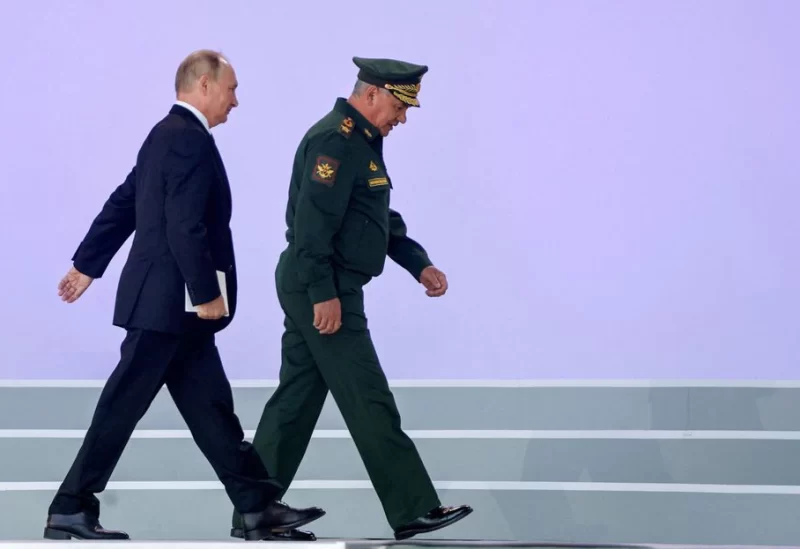
Russian President Vladimir Putin and Defense Minister Sergei Shoigu attend a ceremony opening the international military-technical forum Army-2022 - REUTERS
According to U.S. authorities, his army has made three humiliating retreats from Ukraine in the past year and about 200,000 of his soldiers have died or been injured, but President Vladimir Putin has kept Russia’s defense minister in his position.
According to Western officials, seasoned Kremlin watchers, and former Western military commanders, Sergei Shoigu, 67, is retained by the Russian leader for a variety of reasons, including his extreme loyalty, his role in helping Vladimir Putin win the presidency, and the fact that Ukraine policy is not solely his to decide.
“Loyalty always trumps competence in the Putin inner circle,” said Andrew Weiss, a Putin specialist at the Carnegie Endowment think-tank who held various policy roles on the U.S. National Security Council and has written a book about Putin.
Putin has admitted publicly he finds it difficult to fire people and usually handles such matters personally, said Weiss.
“Several people in senior positions, all of whose job performance leaves a lot to be desired, including Shoigu, benefit from this under-appreciated sentimental side of (Putin’s) personality,” he said.
The Russian Defence Ministry did not respond to a request for comment on Shoigu or its own performance in Ukraine where its forces are pushing hard to try to capture the city of Bakhmut and the town of Vuhledar in the east.
Shoigu, a gruff hardliner who trained as a civil engineer, has held top jobs in Russia’s power structures continuously since the collapse of the Soviet Union in 1991, and served as emergencies minister under late president Boris Yeltsin.
Appointed defence minister in 2012, he is part of Putin’s inner circle and has enjoyed hunting and fishing holidays with him in his native Siberia.
Tatiana Stanovaya, founder of the R.Politik analysis firm and a well-connected Kremlin watcher, said Putin preferred to work with people he knew well despite flaws they might have.
“For him, it’s psychologically easier,” she said, pointing to a profile of Shoigu in which she had highlighted that Shoigu in 1999 was one of the leaders of a political party that helped propel Putin to the presidency.
“Ever since, Putin has been in some sense indebted to Shoigu,” Stanovaya said in the profile for online outlet Riddle.
“The latter has been guaranteed a comfortable place in Russian politics – provided that he did not commit any serious blunders.”
A source close to the Russian authorities who declined to be named because they were not authorised to speak to the media cited an old Russian saying to provide another reason why they thought it was unlikely Shoigu would be replaced anytime soon.
“You don’t change horses mid-stream,” they said, a reference to the need to ensure continuity in turbulent times. The Russian army has been learning from its mistakes and successfully adapting, the source said.
A senior NATO diplomat and a senior EU official said they regarded Putin and his generals as the main decision-makers on Ukraine anyway, rather than Shoigu.
Stanovaya said Shoigu was focused on managing his vast ministry and its ties with the defence industry, meaning that responsibility for the Ukraine campaign was shared.
“Putin himself works (on Ukraine) with the generals, not just with one or two figures, and sometimes gets involved in the (battlefield) situation at a lower level too,” she said.
Sergei Surovikin, dubbed “General Armageddon” by the Russian media, was downgraded to deputy commander of the operation after Valery Gerasimov, the chief of the general staff, was nominated to lead the battle in Ukraine last month.
Unlike Shoigu, both men are military officers by profession. Former Kremlin advisor Sergei Markov claimed that despite his promotion, Surovikin was remained quite active in Ukraine.